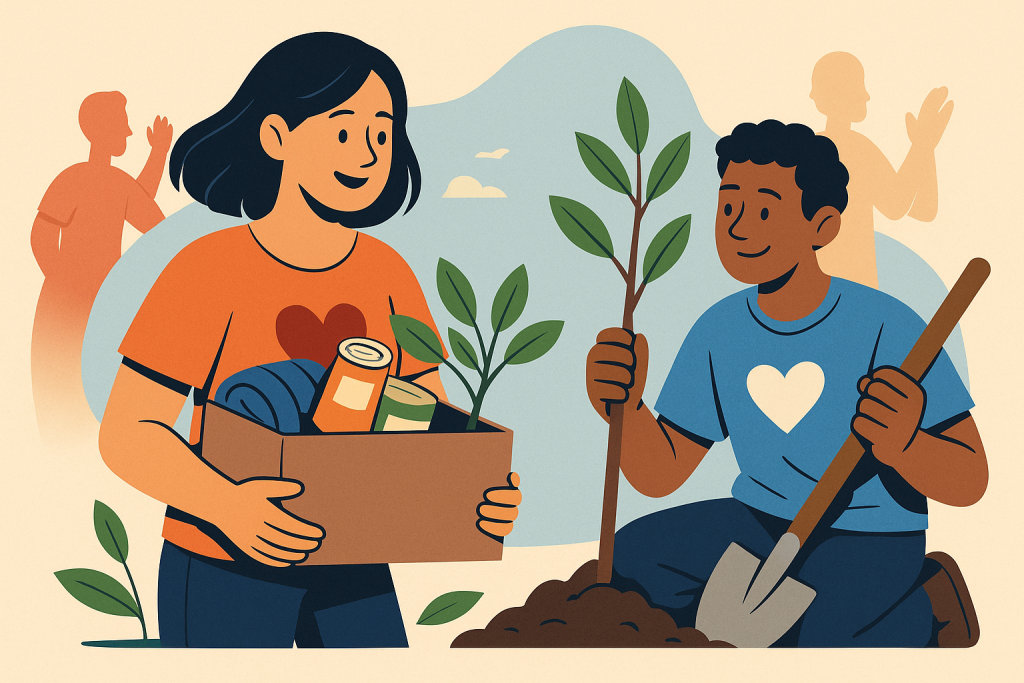Volunteering and giving back is more than just a noble act—it’s a transformative force benefiting both individuals and communities. Recent studies highlight that regular volunteering can lead to improved mental and physical health, enhanced social connections, and a renewed sense of purpose. As society evolves, so do the opportunities and methods for giving back, making it more accessible than ever to make a meaningful impact.

The Multifaceted Benefits of Volunteering and Giving Back
Mental and Physical Health Improvements
Engaging in volunteer activities has been linked to numerous health benefits. Research indicates that volunteers often experience reduced stress levels, lower rates of depression, and even decreased mortality rates. For instance, a study by the Mayo Clinic found that volunteering and giving back can lead to improved physical and mental health, especially among older adults . Additionally, the University of Ghent discovered that volunteering releases hormones like oxytocin and progesterone, which are associated with stress reduction .Psychology Today+2smilesmovement.org+2Mayo Clinic Health System+2Virginia MercuryMayo Clinic Health SystemVolunteerHub
Strengthening Social Connections
Volunteering fosters a sense of community and belonging. By working towards common goals, volunteers build lasting relationships and combat feelings of isolation. A report from the Virginia Mercury emphasizes that volunteering not only benefits communities but also enhances the social well-being of volunteers by building connections and fostering camaraderie .Ross MarinVolunteerHub+2TrueNorth Community Services+2smilesmovement.org+2Virginia Mercury
Personal and Professional Development
Beyond health and social benefits, volunteering offers opportunities for personal growth. Volunteers often acquire new skills, gain valuable experience, and even discover new career paths. The AARP Foundation’s Experience Corps program, for example, not only aids students in improving their reading skills but also provides older adults with a sense of purpose and improved mental health .Wikipedia
Emerging Trends in Volunteering and Giving back
Virtual and Micro-Volunteering
The digital age has revolutionized volunteering. Virtual volunteering allows individuals to contribute from anywhere, making it easier for those with mobility issues or tight schedules to participate. Tasks range from online tutoring to graphic design. Micro-volunteering takes this a step further by enabling people to complete small tasks in short time frames, often without a long-term commitment .communitiesprepared.org.uk+9Inclind+9Candid Blog+9inciteconsultinggroup.com+1Wikipedia+1Wikipedia
Corporate Volunteering Initiatives
Businesses are increasingly recognizing the value of volunteering, both for community impact and employee satisfaction. Corporate volunteering programs not only support local communities but also enhance team building and employee morale. UBS highlights that such initiatives can lead to improved work-life balance and a greater sense of accomplishment among employees .United States of America
Inclusive and Diverse Opportunities
Modern volunteering efforts emphasize inclusivity, ensuring that opportunities are accessible to all, regardless of background or ability. Organizations are actively working to create diverse volunteer programs that cater to various interests and skills, promoting a more equitable and representative volunteer base.
Getting Started: How to Make a Difference
- Identify Your Passion: Consider causes that resonate with you, whether it’s environmental conservation, education, or healthcare.
- Research Opportunities: Platforms like VolunteerMatch and Idealist offer a plethora of volunteering options tailored to different interests and skill sets.Pinterest+1Midland Daily News+1
- Start Small: Begin with manageable commitments, such as a few hours a week, and gradually increase your involvement as you become more comfortable.
- Engage Virtually: If in-person volunteering isn’t feasible, explore virtual opportunities that allow you to contribute remotely.
- Reflect and Share: Regularly assess your volunteering experiences, share your journey with others, and encourage them to get involved.
Conclusion
Volunteering in 2025 is a dynamic and evolving endeavor that offers profound benefits for individuals and communities alike. Whether through traditional means or innovative digital platforms, the act of giving back fosters personal growth, strengthens social bonds, and contributes to a more compassionate society. As opportunities continue to expand and diversify, there’s never been a better time to get involved and make a lasting impact.
References:
- Mayo Clinic. (2023). 3 health benefits of volunteering. Retrieved from https://www.mayoclinichealthsystem.org/hometown-health/speaking-of-health/3-health-benefits-of-volunteeringMayo Clinic Health System+1Virginia Mercury+1
- VolunteerHub. (2024). The health benefits of volunteerism. Retrieved from https://volunteerhub.com/blog/the-health-benefits-of-volunteerismVolunteerHub+1VolunteerHub+1
- Virginia Mercury. (2025). Volunteering benefits your community and health. Retrieved from https://virginiamercury.com/2025/04/24/volunteering-benefits-your-community-and-health/Virginia Mercury
- Wikipedia. (2025). Virtual volunteering. Retrieved from https://en.wikipedia.org/wiki/Virtual_volunteeringWikipedia
- Wikipedia. (2025). Micro-volunteering. Retrieved from https://en.wikipedia.org/wiki/Micro-volunteeringWikipedia
- UBS. (2024). The secret (and not so secret) benefits of corporate volunteering. Retrieved from https://www.ubs.com/global/en/sustainability-impact/our-insights/2024/benefits-of-corporate-volunteering.htmlUnited States of America
- Wikipedia. (2025). Experience Corps. Retrieved from https://en.wikipedia.org/wiki/Experience_Corps









